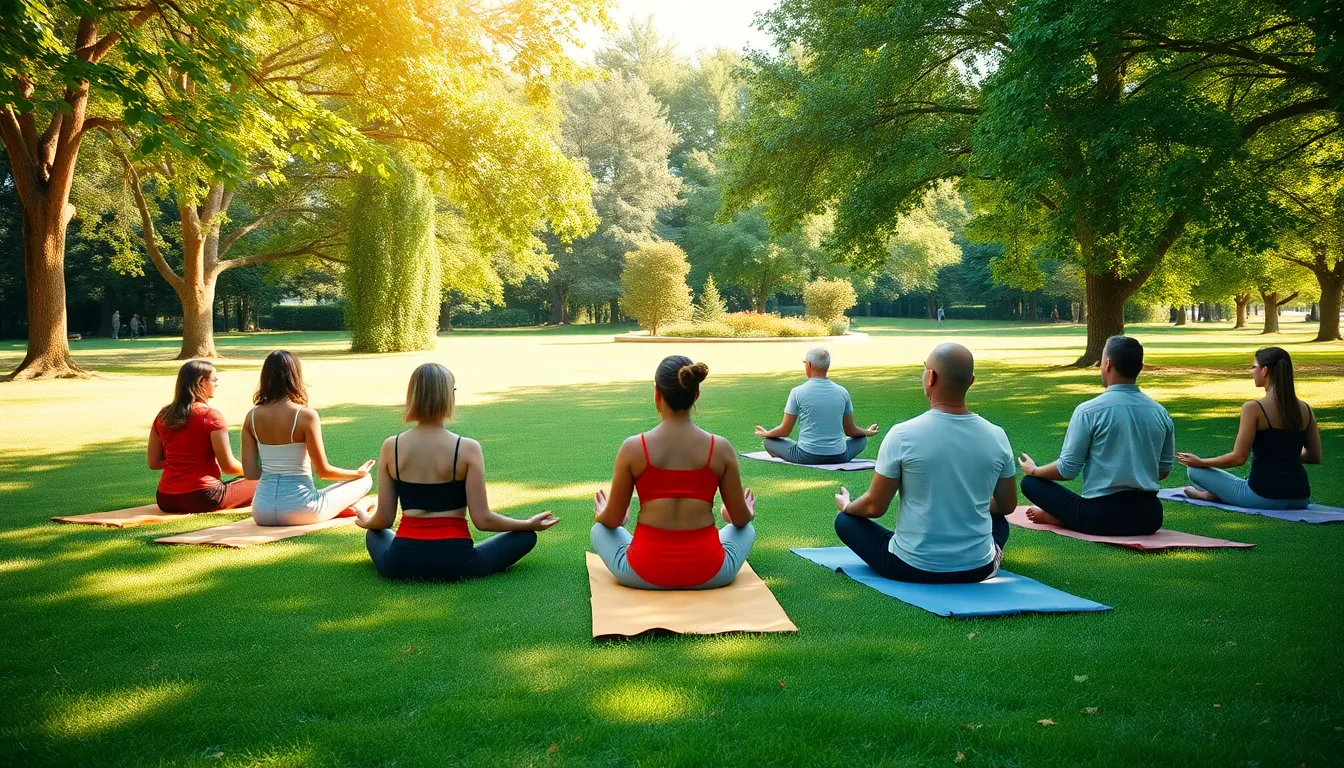Table of Contents
ToggleIn today’s fast-paced world, juggling work, family, and social life can feel like a circus act gone wrong. Amidst the chaos, mindfulness and self-care emerge as the ultimate safety net. Imagine taking a moment to breathe deeply while the world spins around you—sounds refreshing, right? It’s not just about sipping herbal tea and chanting mantras; it’s about reclaiming one’s sanity.
Understanding Mindfulness and Self-Care
Mindfulness and self-care serve as essential strategies for navigating life’s complexities. They empower individuals to cultivate inner peace, enhancing overall well-being.
Definition of Mindfulness
Mindfulness refers to the practice of maintaining a moment-to-moment awareness of thoughts, feelings, bodily sensations, and the surrounding environment. It encourages individuals to observe their experiences without judgment. Practitioners often engage in techniques like meditation and focused breathing. These methods promote deeper connections to the present moment. Research shows that mindfulness reduces stress and anxiety, enhancing emotional regulation. Incorporating simple practices throughout the day aids in fostering a state of mindfulness amidst distractions.
Importance of Self-Care
Self-care plays a pivotal role in maintaining physical and mental health. Prioritizing self-care prevents burnout and improves resilience. Engaging in activities such as exercise, hobbies, or spending time with loved ones rejuvenates the spirit. Self-care practices increase productivity and focus, leading to better performance in work and personal life. Studies highlight that consistent self-care routines enhance overall happiness and life satisfaction. Recognizing personal needs and setting boundaries contributes to effective self-care strategies.
Benefits of Mindfulness and Self-Care


Mindfulness and self-care offer numerous advantages that significantly impact overall well-being. Many individuals experience marked improvements in their daily lives through these practices.
Mental Health Benefits
Increased mindfulness leads to reduced anxiety and depression. Research demonstrates that individuals who practice mindfulness techniques often report enhanced emotional regulation. Engaging in self-care activities fosters a sense of control over one’s emotions. Regular practices promote greater self-awareness, allowing individuals to identify triggers and respond more effectively. Moreover, mindfulness aids in developing resilience, helping individuals cope with stressors more efficiently.
Physical Health Benefits
Mindfulness and self-care contribute significantly to physical health improvements. Individuals participating in mindfulness practices often experience lower blood pressure and improved immune function. Engaging in self-care routines, like regular exercise, enhances physical fitness and vitality. Studies indicate that mindfulness practices can lead to better sleep quality, which is crucial for overall health. Increased awareness of physical needs allows individuals to make healthier lifestyle choices consistently.
Techniques for Practicing Mindfulness
Incorporating mindfulness techniques into daily routines enhances overall well-being. Here are two effective methods to practice mindfulness.
Meditation Practices
Meditation serves as a cornerstone of mindfulness. Various forms exist, including guided meditation, loving-kindness meditation, and transcendental meditation. Beginners often benefit from starting with just five minutes daily. Consistent practice fosters greater awareness and emotional balance. Over time, individuals report improvements in focus and reduced levels of anxiety. Apps like Headspace and Calm offer guidance for those new to meditation, making it accessible and engaging.
Breathing Exercises
Breath control plays a crucial role in mindfulness practice. Focused breathing exercises, such as the 4-7-8 technique, effectively calm the mind. Participants inhale for four seconds, hold for seven, and exhale for eight. This technique lowers stress levels and encourages relaxation. Diaphragmatic breathing also promotes awareness of sensations. Practicing these exercises regularly can lead to improved emotional regulation and enhanced clarity.
Incorporating Self-Care into Daily Life
Adopting self-care practices ensures a balanced and fulfilling lifestyle. Implementable strategies make it easier to prioritize personal well-being amid daily distractions.
Creating a Self-Care Routine
Establishing a consistent self-care routine enhances physical and mental health. Setting aside time each day for activities like exercise, reading, or journaling fosters relaxation. Morning rituals can include 10 minutes of gentle stretching or a nourishing breakfast. Simple pleasures, such as tea breaks during work, can rejuvenate focus and energy. Scheduling these activities into daily calendars reinforces their importance. Small adjustments, like setting a specific time for meditation, lead to lasting improvements in overall happiness.
Setting Boundaries
Establishing healthy boundaries significantly enhances self-care efforts. It’s essential to communicate personal limits in both professional and personal settings. Declining extra responsibilities can prevent feelings of overwhelm and burnout. Prioritizing personal time allows individuals to recharge and engage in self-care activities. Learning to say no without guilt is crucial for personal well-being. Creating a balanced schedule helps ensure time remains available for necessary self-care moments. Clear boundaries support emotional health and assert personal needs, ensuring individuals stay aligned with their self-care practices.
Embracing mindfulness and self-care can transform the way individuals navigate their busy lives. By prioritizing mental and physical well-being through intentional practices and routines, they can cultivate resilience and joy amidst life’s chaos.
Incorporating small yet impactful techniques into daily life allows for a deeper connection to the present moment, fostering emotional balance and reducing stress. Recognizing personal needs and setting boundaries empowers individuals to reclaim their time and energy.
Ultimately, the journey towards a more mindful and self-caring lifestyle not only enhances individual happiness but also enriches relationships and overall life satisfaction. Taking the first step towards this journey can lead to profound changes in well-being and fulfillment.







